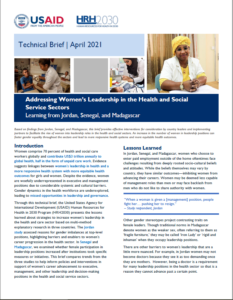03 May Addressing Women’s Leadership in the Health and Social Service Sectors: Learning from Jordan, Senegal, and Madagascar
 Women comprise 70 percent of health and social care workers globally and contribute US$3 trillion annually to global health, half in the form of unpaid care work. Evidence suggests linkages between women’s leadership in health and a more responsive health system with more equitable health outcomes for girls and women. Despite the evidence, women are woefully underrepresented in executive and management positions due to considerable systemic and cultural barriers. Gender dynamics in the health workforce are underexplored, leading to missed opportunities in leadership and governance.
Women comprise 70 percent of health and social care workers globally and contribute US$3 trillion annually to global health, half in the form of unpaid care work. Evidence suggests linkages between women’s leadership in health and a more responsive health system with more equitable health outcomes for girls and women. Despite the evidence, women are woefully underrepresented in executive and management positions due to considerable systemic and cultural barriers. Gender dynamics in the health workforce are underexplored, leading to missed opportunities in leadership and governance.
Through this technical brief, the United States Agency for International Development (USAID) Human Resources for Health in 2030 Program (HRH2030) presents the lessons learned about strategies to increase women’s leadership in the health and care sector based on research conducted in Jordan, Senegal, and Madagascar.
Associated Content
Report: Trends of Women in Leadership in Madagascar’s Health and Social Services Sector
Technical Report: Rise of Women in Leadership in Senegal’s Health and Social Action Sector
Presentation: A Study of Trends and Initiatives in Women’s Leadership in the Health and Social Sector: Progress in Senegal and Madagascar
Overview: Advancing Women’s Leadership in the Health Sector
Blog: Deconstructing Gender Bias in the Health Workforce: Why few women attain leadership positions
Story: Three Questions with Samantha Law: Lifting Up Women in the Name of Health
Report: Evidence-based Interventions to Promote Women in Health Management in Jordan
Country: Jordan, Madagascar, Senegal
Resource Type: Technical Brief
Topic: Women in Leadership
DOWNLOAD





